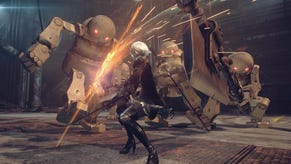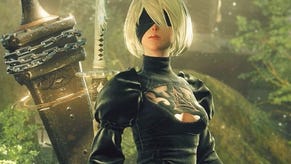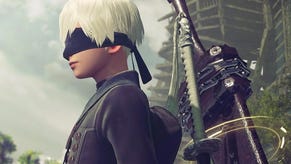Nier
Transgenre.
There's something slightly incongruous about Nier.
Right from the beginning, you'll find strange bedfellows in the gentle orchestra and hefty swearing that accompany the opening credits, and it's not long before the game itself starts to blur traditional boundaries. At Nier's core is a curious clash of Eastern and Western game conventions, blending the physical action combat of Occidental titles with the visual stylings and fishing/farming/amnesia holy trinity of recent JRPGs.
It seems like a bit of an experiment for Square Enix, an attempt to balance a game for the worldwide market by cramming in as much as possible from both sides of the fence. Fittingly, so far the results are a bit of a mixture.
The game opens with a flash-forward tutorial, introducing basic controls and setting some of the scene before the main character is stripped back to basics as the timeline rewinds. The protagonist is a gruffer, older character than you might be used to from Square Enix. He's a father too, which provides the game's narrative focus - instead of saving the world, he's out to save his daughter Yonah from the wasting plague which consumes her.
A more personal motive, then, than the zero-to-hero, world-on-his-shoulders boy-child who traditionally moves these games forward, and a more touching one as a result. Nier is punctuated, in loading screens and through letters from Yonah, with reminders of the fragility of the relationship between father and daughter. People chat about her worsening condition, the unfairness of it all. Our hero is consumed with guilt at leaving her untended when he sallies forth, even though her well-being is his only motivation.
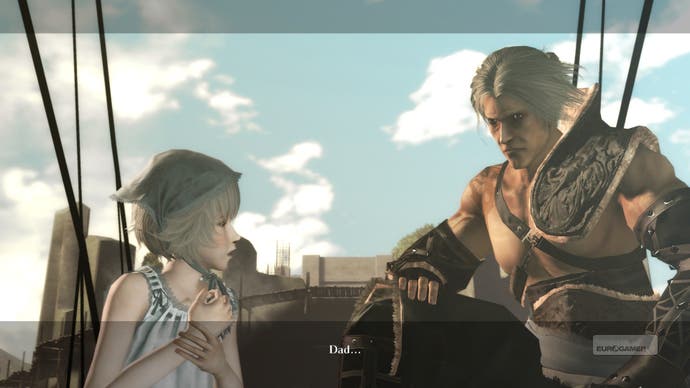
Immediately, this makes Nier engaging. Cast in the role of protector of something so tangible rather than thematic, I found the intrinsic connection between father and child supplanted the awkward emotional exposition which so frequently precedes adventures such as these. Nier's characters are interesting and fairly believable, or at least most of them are; I'll reserve judgement of the intersexual futanari Kaine for a longer look.
The first companion you'll meet, Grimoire Weiss, is a powerful sentient book, full of catty putdowns and powerful magics. He acts more as an accessory than a party member - unlike two later additions - but there's a nice laconic/histrionic back-and-forth between the talking book and Nier that rattles on incidentally in the background as you gad about righting wrongs. Weiss' moral ambiguity and haughty attitude are perfectly couched in the "Alan Rickman after an afternoon on the Valium" voice acting, and the acidity of their banter cuts through the slightly fluffy nature of the main quest line nicely. It's classic buddy movie stuff, and true to form it's not long before the initially off-putting Grimoire starts to show his reticent likeability.
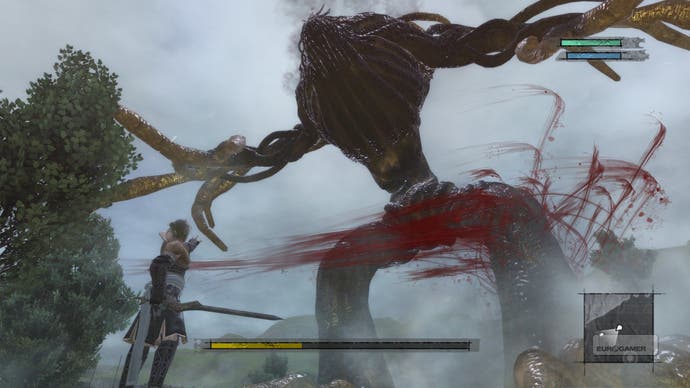
Whilst Nier falls short of a full-on third person hackandslash like Devil May Cry or God of War III, its combat is unashamedly action-heavy. Physical attacks are one-button affairs, with basic combos unleashed by rapid presses. There's a guard break button and jump too, although there's none of Kratos or Dante's aerial juggling. Blocks and rolls complete the roster of fighting manoeuvres, with the acrobatic dodging accentuating the slick and fluid nature of the swordplay.
Encounters occur seamlessly within the expansive environments, which include some classic JRPG staples and range from the banal and innocuous (I spent a good 40 minutes wailing on some pretty vicious sheep and goats) to the sort of glutinous, absurd behemoth which wouldn't be out of place troubling anime schoolgirls.







